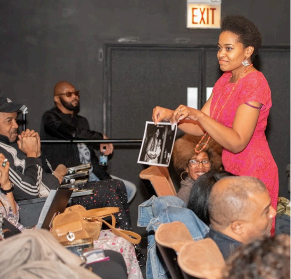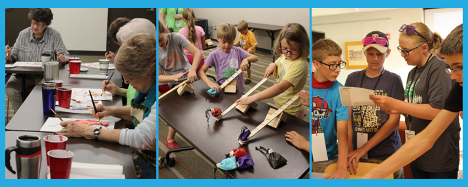Will support Humanities Organizations to boost virtual tools, coronavirus storytelling
CHICAGO, August 24, 2020 — Illinois Humanities announced today that it has awarded 35 additional COVID-19 Emergency Relief Grants, totaling $190,000 in new funds, to help Illinois nonprofits boost their digital offerings and tell the story of how their community is showing resilience in facing coronavirus. This brings the total COVID-19 emergency relief support to 189 grants statewide totaling $710,000, the bulk of it in the form of general operating or unrestricted grants.
As events, festivals, camps, venue rentals and summer sessions continue to be cancelled, humanities organizations across Illinois are struggling to survive. Arts and cultural organizations who applied for support have reported more than $11 million in current and projected losses through 2020 and nearly 25% of grantees have already had to lay off staff.
But they’re also showing resilience and an eagerness to come out of this crisis stronger.
“As COVID-19 continues to devastate Illinoisans, Illinois Humanities is more committed than ever to ensuring our diverse humanities organizations are not only equipped to survive the pandemic but also able to transform the ways in which they creatively provide programming,” said Illinois Humanities Executive Director Gabrielle Lyon, PhD. “These organizations are planning to pivot in order to bolster their online humanities offerings, in order to better engage audiences, and to tell the story of how their communities are experiencing this crisis.”
Funds for this round of grants were provided by the National Endowment for the Humanities (NEH) through the Coronavirus Aid, Relief, and Economic Security (CARES) Act of 2020. This cycle includes 20 Innovation & Adaptation grants, totaling $100,000, and 15 Community Resilience grants that together total $90,000. The 35 projects straddle the entire state of Illinois.
Nine of the 20 Innovation and Adaptation projects were based in Cook County, the rest outside. Others included support for using virtual platforms to bridge urban and rural audiences, take oral histories online, host discussions, produce a zine, help disseminate the work of researchers, produce a virtual tour of a community’s murals, and create a toolkit for digital archiving.
One of the Innovation & Adaptation grant recipients, Honey Pot Performance, is a creative Afro-feminist non-profit founded in 2001 that harnesses movement, theater, and first-voice to examine the nuanced ways people negotiate identity, belonging, and difference in their lives and cultural memberships. HPP produced the Chicago Black Social Culture Map (CBSCM) as a series of partnerships and events (“Archiving Days”) meant to document Black social culture from the Great Migration through the early 21st century, with a focus on the emergence of house culture in the 1970s and 1980s.

Meida McNeal, artistic & managing director for Honey Pot Performance, estimates a loss of at least $7,500 as a result of COVID-19, as well as potential loss of staff and space. But the group, which became a 501c3 in the past year, is preparing to take advantage of this moment to grow its virtual programming.
“We are adapting to the pandemic by imagining new ways to center and connect with communities,’ McNeal said. “We have taken our Chicago Black Social Culture Map project online with a series of monthly conversations and half-day events exploring the impact of Chicago house music and other forms of Black social culture on our communities. We are also co-presenting the If/Then (Virtual) Festival featuring a range of BIPOC artists in sound, performance, visual arts, and healing with Arts + Public Life at the Green Line Performing Arts Center in November.”
The Effingham Public Library serves a largely rural population in Effingham County, in South Central Illinois. As in many communities, efforts to combat the virus have strained public services. The Library has stepped up during COVID-19 in multiple ways; for example, staff has taken laptops and WiFi to rural communities in the county to help people apply for unemployment. The library building was physically closed from March 23 until June 4, and even now visitors can only access a small portion of the main floor.

With Illinois Humanities support, the Library is taking on an inspiring Community Resilience project. “Effingham: At the Crossroads of Education” will feature photography and interviews to illustrate how the pandemic has affected teachers and students and to challenge assumptions about how school happens in the county. The Library will partner with a renowned local photographer, Tytia Habing, to illustrate actions such as those taken by local teachers and principals, who cooked and drove to deliver meals so their students wouldn’t go hungry, and organized ‘teacher parades,’ so that young students could see their teachers go by. The photographs will be exhibited during the Effingham Artisan Fair, Oct. 9-10, as well as online.
“On one level the work celebrates collaboration between parents, students, school support staff and teachers as they work to keep each other safe while providing quality education,’ said Johnna Schultz, assistant director of the Library. “But on a deeper level, the work acknowledges the tension that the American promise of equal education for all simply isn’t possible – and this pandemic has created an education gap that will negatively affect many.”
Of the 15 Community Resilience projects, 8 are based in the city of Chicago, 7 elsewhere in the state. They include a series of articles based on family stories from Auburn Gresham, South Shore, and Austin, a series of interviews with Latinx and African-American residents of Lake County, a series of youth-produced videos created in partnership with the African-American Museum of Southern Illinois in Carbondale, a series of photographs and quotes from rural teachers and students in the Effingham area, and a live-streamed dialogue on race and identity in the time of COVID.
To see a complete list of the organizations funded by Illinois Humanities with CARES Act support, click here.
The 35 organizations funded in this round of COVID-19 relief grants include:
Innovation & Adaptation grants (20)
Carbondale – African American Museum of Southern Ill.
Carbondale – Y’all Rock Carbondale (Libre)
Chicago – Changing Worlds
Chicago – Chicago Collections Consortium
Chicago – Chicago Public Art Group
Chicago – Go Veggie / National Vegetarian Museum
Chicago – Honey Pot Performance
Chicago – National Public Housing Museum
Chicago – Repertorio Latino Theater Company
Chicago – The Voices and Faces Project
Galesburg – Discovery Depot Children’s Museum
Rock Island – Ballet Quad Cities
Springfield – Looking for Lincoln Heritage Coalition
Waukegan – Ray Bradbury Experience Museum
West Chicago – Mexican Cultural Center
Community Resilience grants (15)
Atlanta – Atlanta Public Library District
Aurora – Aurora Regional Fire Museum
Carbondale – Carbondale Community Arts
Chicago – BECOME: Center for Community Engagement & Social Change
Chicago – Changing Worlds
Chicago – Chicago Cultural Alliance
Chicago – Collaboraction Theatre Company
Chicago – ConTextos
Chicago – Full Spectrum Features NFP
Chicago – Kuumba Lynx
Chicago – South Side Weekly NFP
Galena – Galena Center for the Arts
Effingham – Effingham Public Library
Riverwoods – Brushwood Ctr at Ryerson Woods
Savanna – Savanna Historical Society
###
About Illinois Humanities
Illinois Humanities activates the humanities through free public programs, grants, and educational opportunities that foster reflection, spark conversation, build community, and strengthen civic engagement. Illinois Humanities is a nonprofit organization and the state’s affiliate for the National Endowment for the Humanities. Learn more at ilhumanities.org and on Facebook, Twitter, Instagram and LinkedIn @ILHumanities.